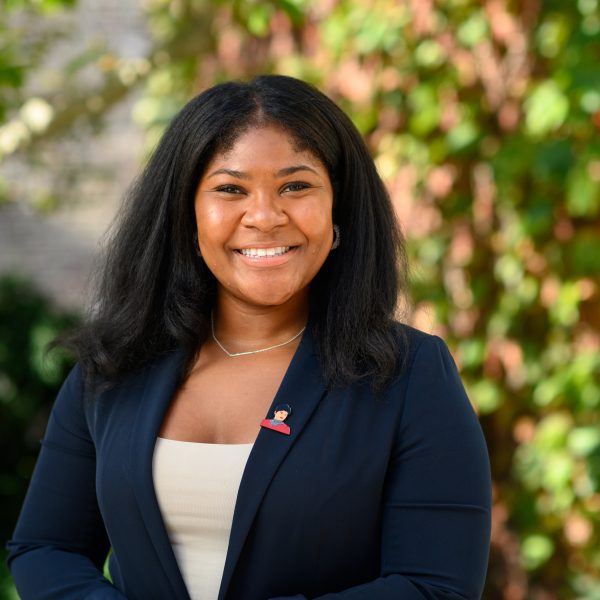December 2024: Dr. Christine Slaughter (CAS)
 Dr. Christine M. Slaughter is an Assistant Professor of Political Science at Boston University. She received her Ph.D. in 2021 from the University of California, Los Angeles (UCLA). Before joining the department, she completed a postdoctoral fellowship in the Department of Politics at Princeton University, and the University of California, Irvine.
Dr. Christine M. Slaughter is an Assistant Professor of Political Science at Boston University. She received her Ph.D. in 2021 from the University of California, Los Angeles (UCLA). Before joining the department, she completed a postdoctoral fellowship in the Department of Politics at Princeton University, and the University of California, Irvine.
Her research examines African American politics, with a focus on how economic inequality, gender, and psychological resources such as resilience influence the frequency and substance of African American political engagement and behavior.
Her research has been published in the Journal of Health Politics, Policy, and Law, PS: Politics and Political Science, and PHILLIS: The Journal for Research on African American Women (PHILLIS). She is the author of forthcoming book chapters focused on intersectionality in political behavior. Her research has been supported by fellowship and grants from the Ford Foundation, the American Political Science Association, and the National Science Foundation. At UCLA, she received support from the Institute of American Cultures and the Ralph J. Bunche Center for African American Studies.
What made you decide to be a social scientist/ why does social science matter to you?
Social scientists take observations about the world and examine them empirically. I wanted to be a social scientist when I realized that we hypothesize about the world, and society, and then test it. For instance, as a college student, I observed that people participated in politics at varying rates, and not everyone felt motivated to participate. I wanted to know more about motivation, and political structures and opportunities. I learned that we could survey people to ask them why, and then analyze their responses. I learned there was a scientific process. There was a method to surveying. I specifically wanted to do this in politics, government, and activism spaces. Social science matters because we don’t simply make generalizations, we back those generationalizations with evidence. We record the process. That’s invaluable.
Can you tell us about a recent research project that you’re excited about?
Well, I am wrapping up my book manuscript, so I am excited about that. But, it’s a project that I have worked on for several years, and presented at national and international venues. In fact, I started my prospectus in 2018! I am still very much excited about it. I can’t want to share it with the academic community. I really believe its important for a concise narrative around Black resilience to adversity to exist as it relates to politics. But, I am starting a new project that builds on my earlier research on Black political participation. This new project involves conducting interviews with people who’ve been active in their communities to reduce racial and economic inequality. Given that inequality looms large, and there’s a persistent racial wealth gap, I am interested in why and how activists and organizers remain motivated in their efforts, and how they connect these local efforts to national politics. Of course, the election’s outcome has shifted the discussion in some interviews, but not all. People are frustrated and believe that neither political party does enough to alleviate longstanding poverty. Early on, I’ve found that community leaders remain frustrated with available resources. It’s still early in the project, but I am geeked to collect new interview data before combining these insights with survey results
What is the best piece of professional advice you ever received?
One of my mentors reminds me that it’s okay to say no. There are so many projects that I want to take on, so many questions that interest me, and so many outlets that I’d like to present research to, and speak with. But not all opportunities are good opportunities, and it’s okay to turn down what doesn’t feel right. This professional advice shakes the mindset that we must do it all to succeed. This is much more relevant when I center this advice on my identity as a Black woman. The Superwoman schema (developed by a psychologist!!) can lead Black women to poorer outcomes. It’s okay to ask for help. In fact, it’s more important to be strategic and say yes to opportunities that align with the vision for your career and, as a social scientist, your research agenda. It’s a balance to be struck. Therefore, I follow her guidelines when deciding whether to take on something new.
What is your favorite course you’ve taught at BU?
Each course that I teach has its own flare. It’s hard to identify a favorite! If I had to say, it was the course I taught on Resilience to Adversity in Black Politics my first year at BU. The course readings were based on my dissertation research. It was a great group of students, and since it was a seminar, we had lengthy, thoughtful and robust discussions. While the course was for undergraduates, I prepared it as a graduate seminar. In fact, several of the students have gone off to PhD programs. I would love to teach the course again. There was a deep dive on inequality, intersectionality, Black political behavior, Black political attitudes, and Black political socialization. We studied music and culture, and how it related to the political themes in the course. These are the areas I focus on, making it my favorite course.
Tell us a surprising fact about yourself.
I’m also named after both of my grandmothers. One is named Christine, and the other was named Marie. They’re both deceased now, so I carry their names along with me everyday!